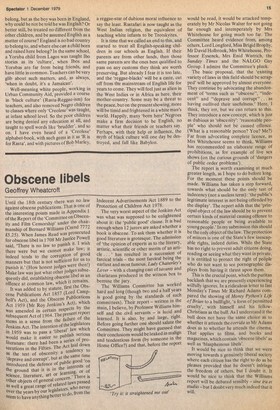Obscene libels
Geoffrey Wheatcroft
Until the 18th century there was no law against obscene publications. That is one of the interesting points made in Appendix 1 of the Report of the 'Committee on Obscenity and Film Censorship' under the chairmanship of Bernard Williams (Cmnd 7772 f5.25). When James Read was prosecuted for obscene libel in 1708 Mr Justice Powell said, 'There is no law to punish it. I wish there were but we cannot make law; it indeed tends to the corruption of good manners but that is not sufficient for us to punish it.' (How honest judges were then!) Make law was just what other judges subsequently did, establishing obscene libel as an offence at common law, which it remains. It was added to by statute, first the Obscene Publications Act 1857 (Lord Campbell's Act), and the Obscene Publications Act 1959 (Mr Roy Jenkins's Act), which Was amended in certain respects by the subsequent Act of 1964. The present report stems in a sense from the failure of the Jenkins Act. The intention of the legislators in 1959 was to pass a 'liberal' law which Would make it easier to publish serious literature: there had been a series of prosecutions in the Fifties. The Act laid down as the test of obscenity a tendency to ,deprave and corrupt', but at the same time introduced the defence of public good 'on the ground that it is in the interests of science, literature, art orlearning, or of Other objects of general concern. There is as well a great range of related laws passed ever the years by our legislators, who never seem to have anything better to do, from the Indecent Advertisements Act 1889 to the Protection of Children Act 1978.
The very worst aspect of the Jenkins Act was what was supposed to be enlightened about it: the 'public good' clause. It is bad enough when 12 jurors are asked whether a book is obscene. To ask them whether it is good literature is grotesque. The admission of 'the opinion of experts as to the literary, artistic, scientific or other merits of an article . . . has resulted in a succession of farcical trials — the most farcical being the earliest and most famous, Lady Chatterley's Lover — with a changing cast of savants and charlatans produced in the witness box to bemuse the jury. The Williams Committee has worked hard and long (though two and a half years is good going by the standards of such committees). Their report — written in the main, I believe, by Professor Williams himself and the civil servants — is lucid and learned. It is also, by and large, right. Before going further one should salute the Committee. They might have guessed that their conclusions would be leaked in malign and tendentious form (by someone in the Home Office?) and that, before the report would be read, it would be attacked temperately by Mr Nicolas Walter for not going far enough and intemperately by Mrs Whitehouse for going much too far. The Committee heard evidence from, among others, Lord Longford, Miss Brigid Brophy, Mr David Holbrook, Mrs Whitehouse, Professor Eysenck, Mrs Enid Wistrich, the Sunday Times and the NALGO Gay Group. I admire the Committee's pluck.
The basic proposal, that the 'existing variety of laws in this field should be scrapped' will be approved by almost everyone. They continue by advocating the abandonment of 'terms such as "obscene", "indecenl" and "deprave and corrupt". . . as having outlived their usefulness.' Here, I think, they err, but we can return to this. They introduce a new concept, which is just as dubious as 'obscenity': 'reasonable people' who should not be caused offence. (What is a reasonable person? You? Me?) Far from advocating complete licence, as Mrs Whitehouse seems to think, Williams has reconunended an elaborate range of prohibitions, as for example of live sex shows (on the curious grounds of 'dangers of public order problems').
The report is worth examining at much greater length, as I hope to do before long. For the moment these points should be made. Williams has taken a step forward, towards what should be the only test of indecency (not a useless term): 'the public's legitimate interest in not being offended by the display'. The report adds that the 'prin cipal object of the law should be to prevent certain kinds of material causing offence to reasonable people or being available to young people.' In my submission this should be the only object of the law. The protection of minors is one of the State's few inescapable rights, indeed duties. While the State has no right to prevent adult citizens doing, reading or seeing what they want in private, it is entitled to protect the right of people who do not want to see pornographic displays from having it thrust upon them. This is the crucial point, which the puritan backlash that we are presently experiencing wilfully ignores. In a ridiculous letter to last Monday's Times Mr Richard Adams compared the showing of Monty Python's Lift of Brian to a bullfight, 'a form of permitted cruelty', with himself and his fellowChristians as the bull. As I understand it the bull does not have the same choice as to whether it attends the corrida as Mr Adams does as to whether he attends the cinema. That applies to films, and books and magazines, which contain 'obscene libels' as well as 'blasphemous libels'. It would be nice to think that we were moving towards a genuinely liberal society where each citizen has the right to do as he pleases provided that he doesn't infringe the freedom of others, but I doubt it. It would be nice to think that the Williams report will be debated sensibly — sine ira et studio —but I doubt very much indeed that it will.











































 Previous page
Previous page